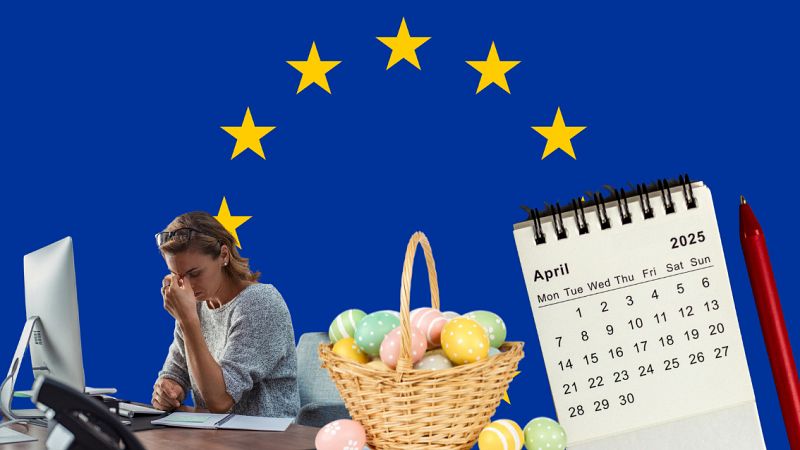
The EU’s motto is ‘United in Diversity’, and it shines through whether you cook with olive oil or butter.
But nothing splits Europe down the middle quite like Easter holidays. If you're confused about who’s off and when, don’t worry, so is the rest of Europe.
Though Easter has largely lost its religious weight in increasingly secular Europe, its public holiday status varies greatly across the continent: From Good Friday to Pentecost Monday, different countries mark different days as public holidays.
And let's be honest: there are never quite enough holidays for workers, so it’s only natural to look across the border and feel a twinge of envy.
So, what does the Easter holiday map look like across the EU?
A reversal of the Protestant work ethic
Just like the butter-versus-olive-oil divide, there’s a clear North-South split when it comes to Easter holidays.
Northern Europe, particularly countries with Protestant roots, tends to grant more days off during Easter than their Southern, Catholic counterparts.
Not so obvious, given the so-called Protestant work ethic described by sociologist Max Weber as the foundation of capitalism.
Yet, traditionally "hard-working" nations like Germany go big on Easter, observing almost the full Easter holiday package - Good Friday, Easter Monday and even Ascension Day and Pentecost Monday.
Oddly enough, Easter Sunday itself isn't a nationwide public holiday there except in the state of Brandenburg.
Easter Sunday surprise

Germany is not an exception: In many EU countries, Easter Sunday isn’t officially recognised as a public holiday - and not because it's not important, but because it already falls on a non-working day.
Instead, the emphasis shifts to Easter Monday, which is a public holiday in most places.
At least 12 EU countries, including Austria, France, Czechia, Slovakia, Croatia, Slovenia, and Luxembourg, do not count Easter Sunday as an official holiday for the same reason.
That said, Easter Monday is a public holiday across nearly all of the EU, except for a few exceptions like Spain, where it’s only a holiday in certain autonomous regions such as Catalonia, the Basque Country, Navarre; and Portugal, where it’s not officially recognised at all.
The Good Friday patchwork
Malta flips the script: it doesn’t observe Easter Monday or any other day with a day off for workers, except Good Friday which is a national public holiday.
Some notable EU countries don’t consider Good Friday a holiday, including Italy, France, Slovenia, and Lithuania - despite some of these being traditionally Catholic nations.
In Belgium (where this article is being tapped out while definitely not on holiday), today is like any ordinary working Friday.
In Ireland, Good Friday isn't a statutory holiday either, but it is often observed informally, with many businesses choosing to close.
Austria used to treat Good Friday as a “selective” holiday for members of certain religious denominations, such as the Old Catholic Church and Methodists.
That changed after a 2015 case involving a private detective agency employee who claimed religious discrimination for not receiving holiday pay. The case reached the EU Court of Justice, which ruled in 2019 that such selective holidays based on religion amounted to direct discrimination.
The extended Easter: Ascension, Pentecost (and Maundy Thursday)
Think Easter ends after the Sunday chocolate binge? Think again. Ascension Day (40 days later) and Pentecost Monday (50 days after) are celebrated with some days off.
If you’re in Austria, Belgium, France, Germany, or the Netherlands, lucky you, both days are public holidays. Meanwhile, places like Greece, Hungary, and Portugal skip them entirely.
In Denmark, Italy, Poland, and Sweden, only Ascension Day is observed, meaning that Pentecost is not a day off.
Maundy Thursday (the day before Good Friday) is generally not a public holiday across most of the EU, but it does get some attention.
In Denmark, where it’s called “Skærtorsdag”, it's a legit national holiday. In Spain, certain regions such as Andalusia, Castilla and León also treat it as a day off - because when in doubt, add another holiday.

.jpg?w=600)





